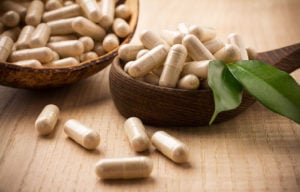Reduce Your Inflammation with This Popular Supplement
Probiotics are a key component for better gut health, a stronger immune system, and much more. In this post, we discuss the role of probiotics in reducing inflammation.
If you need help healing your gut, click here
Reduce Your Inflammation with This Popular Supplement
Probiotics are a key component for better gut health, a stronger immune system, and much more. Probiotics not only improve the balance of your gut microbiota in favor of the healthy bacteria, but are also helpful in either preventing or improving the outcomes of a number of health conditions, such as obesity, insulin resistance, type 2 diabetes, non-alcoholic fatty liver disease, mental health issues, and neurological disorders.
Some beneficial effects of probiotics include modulation of intestinal microbiota, strengthening of the epithelial barrier, and immunomodulation.
A recent systematic review with meta-analysis evaluated the role of probiotics for reducing inflammation. This type of study is a very reliable source since it is a compilation of numerous individual clinical trials. The study consisted of 20 clinical trials that looked at the effect of probiotics on reducing CRP.
Serum C-reactive protein (CRP) is a marker of systemic inflammation, and is elevated in the presence of chronic conditions.
The systematic review confirmed that probiotics significantly reduce inflammation, specifically CRP (C-reactive protein).
It wasn’t just one type of probiotic either. Many different strains of probiotics were used in the different trials. Therefore, we can conclude that probiotics as a class are effective for reducing inflammation.
How can probiotics reduce inflammation?
Several mechanisms have been suggested concerning the impact of probiotics on inflammation and inflammatory factors.
- Probiotics can prevent or repair ‘leaky’ epithelial barriers and indirectly affect the inflammatory response.
- Probiotics increase production of short-chain fatty acids (SCFA), such as butyrate, which has an anti-inflammatory function.
- Probiotics enhance synthesis of antimicrobial peptides that influence inflammation resolution pathways in the mucosa.
- The anti-inflammatory properties of some strains of probiotics are thought to act by reducing mucosal inflammation via modulation of cytokine levels.
- The decreased inflammation and oxidative stress due to probiotics might be due to their effects on increasing glutathione (GSH) levels.
- The gut is a main source of inflammation. Probiotics have demonstrated they can help heal the gut, and therefore drive down inflammation.
- Your immune system is a major contributor to inflammation. The majority of your immune cells reside in your intestine where the probiotics work. Probiotics have immune modulating properties.
- Probiotics may also help reduce unhealthy bacteria and fungus in the gut. Through this process, inflammation will be reduced.
What does this information mean?
If you’re not feeling well, start by healing your gut. There are many components involved in healing your gut, but taking a high quality probiotic along with an anti-inflammatory diet is a great place to start.
To learn more about probiotics and inflammation, watch our video here.
If you need help healing your gut, click here
What do you think? I would like to hear your thoughts or experience with this.
Dr. Ruscio is your leading functional and integrative doctor specializing in gut related disorders such as SIBO, leaky gut, Celiac, IBS and in thyroid disorders such as hypothyroid and hyperthyroid. For more information on how to become a patient, please contact our office. Serving the San Francisco bay area and distance patients via phone and Skype.

Discussion
I care about answering your questions and sharing my knowledge with you. Leave a comment or connect with me on social media asking any health question you may have and I just might incorporate it into our next listener questions podcast episode just for you!